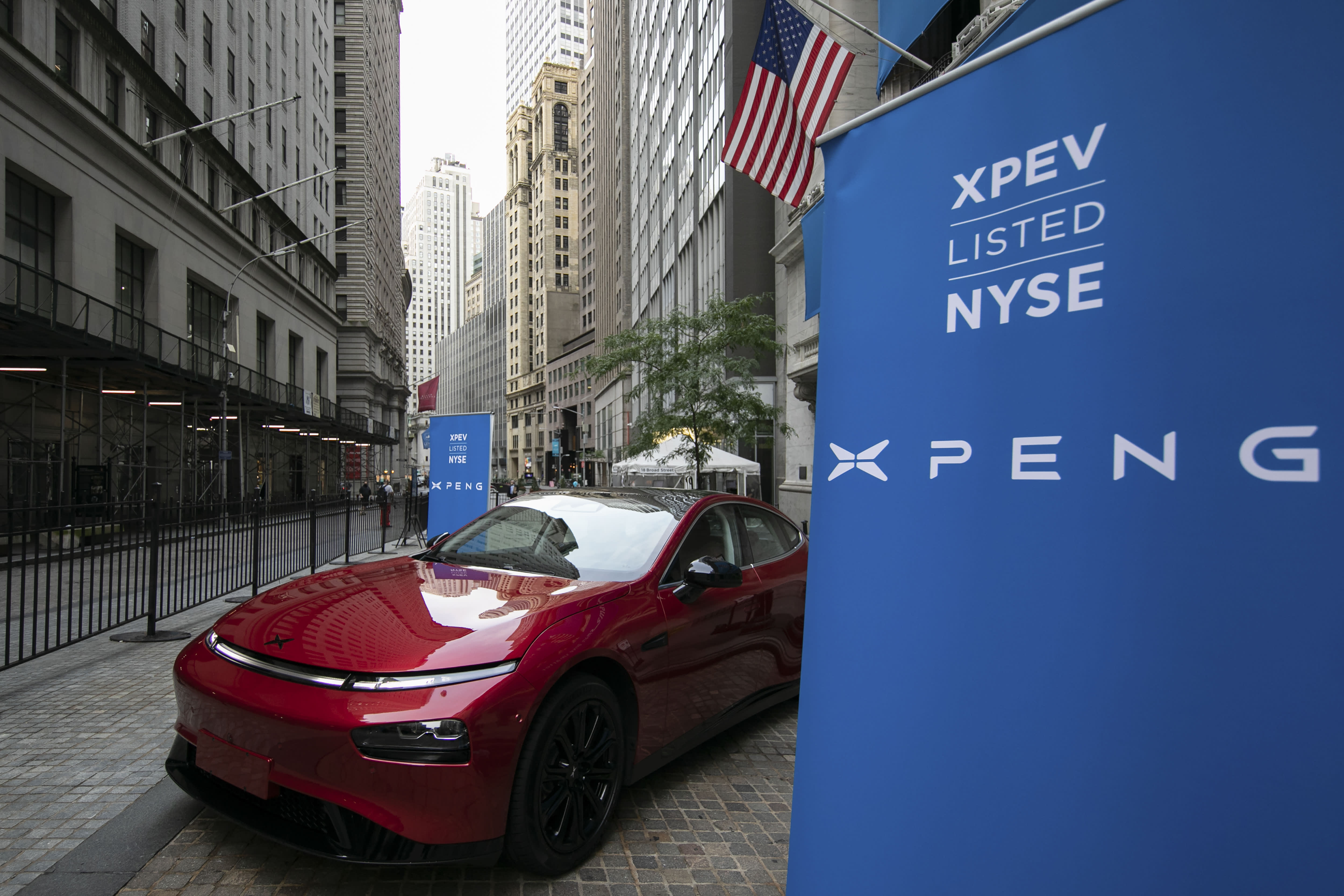
The Xpeng P7 electric vehicle displayed outside the New York Stock Exchange on Aug. 27, 2020 when the Chinese electric vehicle launched its initial public listing.
Jeenah Moon | Bloomberg | Getty Images
BEIJING — Chinese companies are rushing to go public in the red-hot IPO market in the U.S. — before it loses steam.
The first three months of the year marked the busiest quarter for overall U.S. initial public offerings since 2000, according to consulting firm EY.
Despite the coronavirus pandemic and tensions between the U.S. and China, half of 36 foreign public listings in the U.S. during that time came from companies based in Greater China, EY said.
More are coming.
About 60 Chinese companies plan to go public in the U.S. this year, Vera Yang, chief China representative for the New York Stock Exchange, said Tuesday.
"From our interaction with companies, our sense is they would like to lose no time (in listing)," Yang said in a Mandarin-language interview, translated by CNBC. She pointed to uncertainties such as those brought by the pandemic, and a likely tightening of monetary policy in the longer term that would reduce the availability of capital.
Our phone is ringing off the hook. We're trying to hire more people. We haven't seen anything like this since the Nasdaq bubble in '99. Makes me worried.
Gary Dvorchak
managing director, Blueshirt
Delisting concerns have calmed down since President Joe Biden took office in January, and market participants expect a compromise, said Blueshirt managing director Gary Dvorchak, who advises Chinese companies interested in listing in the U.S.
"It's a tidal wave," he said of the Chinese IPO pipeline.
"Our phone is ringing off the hook. We're trying to hire more people. We haven't seen anything like this since the Nasdaq bubble in '99," he said. "Makes me worried."
The rich get richer
In the late 1990s, a surge of speculation in new technology companies ranging from Pets.com to Cisco fed a U.S. stock market bubble that began to burst in 2000, in what came to be known as the "dotcom bubble."
This year, investor caution about viable business ventures caused capital to pile into just a few of the same companies, rather than spreading out their bets. The trend holds in China, home to many of the world's so-called unicorns — or start-ups valued at $1 billion or more.
Hongye Wang, China-based partner at venture capital firm Antler, said that anecdotally, more people are asking him for shares in unicorns than in earlier-stage start-ups.
"A lot of companies cannot raise a lot of money, or their valuation(s) are decreasing. But if you look at the unicorns, especially the pre-IPO unicorns, their valuation is still crazy," he said.
Just take popular Chinese soda water company Genki Forest, which earlier this month reportedly secured another capital injection — of $500 million — bringing its valuation to $6 billion. In contrast, one of the biggest fundraising rounds in yuan that week was a much smaller 600 million yuan ($92.3 million) series B injection into Abogen Biosciences, according to Crunchbase.
In a sign that some valuations may be too high, many Chinese stocks listed in the U.S. and Hong Kong have slumped after their initial public offerings this year.
For example, in February Chinese short-video app Kuaishou soared 160% to $300 a share in the biggest internet company IPO since Uber, and the largest Hong Kong debut since the pandemic. But its stock has struggled to build on those gains, and closed at $274 a share on Tuesday.
"The after-IPO pricing trend is not as good as last year," said Ringo Choi, Asia-Pacific IPO leader at EY. He expects a slowdown in public offerings beginning in the third quarter of this year, especially if the macroeconomic environment takes a turn for the worse.
For now, a few of China's largest start-ups are still in the IPO pipeline, although the timing is unclear. Beijing-based ByteDance, owner of popular short-video app TikTok, is the biggest unicorn in the world, while Chinese ride-hailing company Didi Chuxing ranks fourth, according to CB Insights.
Investors are "supportive, but more selective" of Chinese companies that might be able to sustain high valuations, Yang said, citing conversations with various investment funds.
She said that among China-based businesses listing in the U.S. this year, the first area of interest is a category known as technology, media and telecommunications. That's followed by consumer brands and business services, Yang said.
April 28, 2021 at 08:34AM
https://www.cnbc.com/2021/04/28/a-tidal-wave-of-chinese-companies-rush-into-the-red-hot-ipo-market-in-the-us.html
A 'tidal wave' of Chinese companies rush into the red-hot IPO market in the U.S. - CNBC
https://news.google.com/search?q=Red&hl=en-US&gl=US&ceid=US:en

No comments:
Post a Comment